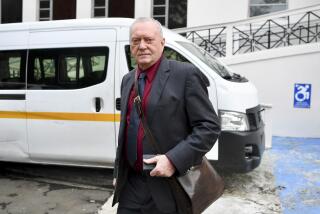N. Hollywood Businessman Guilty on 20 Counts in Tax Fraud Case
- Share via
Gerald L. Schulman, the nation’s largest manager of post office buildings and a prominent contributor to the Democratic Party, was convicted Friday of 20 counts of criminal tax fraud by a federal judge in Los Angeles.
U.S. District Judge Mariana R. Pfaelzer’s decision came more than two months after she finished hearing the case, in which government prosecutors sought to show that tax shelters Schulman promoted in 1978 defrauded the government of $28 million by taking interest deductions on phony loans he arranged. Pfaelzer found Schulman innocent on two counts of perjury.
Prosecutors said Schulman, 56, faces a maximum of 64 years in federal prison on the conviction. Lawyers for the North Hollywood businessman would not comment on Pfaelzer’s decision but did tell her that they will file a motion requesting a new trial. If the motion is denied, prosecutors said, Schulman could be sentenced in April.
Schulman was one of the nation’s largest promoters of tax shelters in the late 1970s and early 1980s before recent changes in federal tax laws discouraged the use of many of the kinds of programs he promoted.
Attorneys representing investors estimate that at least 5,000 people put more than $200 million into his programs. Public records show that he attracted such celebrity investors as actor/director Woody Allen and major league baseball pitchers Frank Tanana and Shane Rawley.
Under the Schulman tax shelter plans, investors paid from as little as $5,000 to more than $1 million in some cases to become limited partners in groups that would buy post office buildings.
The money they invested purportedly was used to make interest payments, which Schulman claimed would be tax deductible, on loans from a finance company in the Netherlands Antilles called Hexagram.
The money from those Hexagram loans, in turn, was purportedly deposited interest-free for a year with a Panamanian company called Parallax. In exchange, Parallax promised to arrange financing for the partnerships to buy the post office buildings, which were leased by the U.S. Postal Service.
But government prosecutors argued that the loans and their tax-deductible interest payments were a sham and that Schulman created the illusion that they were real transactions through an elaborate paper-shuffling scheme.
Relying largely on expert witnesses who studied bank transactions, prosecutors argued that Schulman orchestrated the shuffling of hundreds of millions of dollars through accounts in foreign banks, often in a single day.
On Oct. 31, 1978, for example, $95 million in debits and credits were made in some 50 accounts at one Panamanian bank, according to court records. Most of the accounts started with balances of $250 or less, records show, and ended the day with the same balances.
Schulman’s lawyers argued that the loans were real. They also called former Gov. Edmund G. (Pat) Brown to testify on his behalf as a character witness. Schulman is a former member of a private, nonprofit government affairs institute in Los Angeles that is named after Brown.
Schulman is, in effect, the U.S. Postal Service’s single largest landlord. One of his companies, Postal Management Services, which manages the buildings for the partnerships, claims to be the nation’s largest manager of post office, telephone, state and federal buildings.
State and federal elections records show that Schulman and his family are major contributors to Democratic politicians and he is also a prominent philanthropist. An exotic bird hatchery at the San Diego Zoo was named in his honor in 1981 for his support of bird conservation and research. In 1983, he was named “Man of the Year” by the Los Angeles Guild for Cystic Fibrosis.
Schulman, a general partner in all the partnerships, still faces civil suits from investors seeking the return of hundreds of millions of dollars invested and for damages connected with tax deductions disallowed by the IRS.
Pfaelzer’s decision surprised lawyers in the case because she had dismissed the tax fraud charges in June, 1986. They were reinstated last May by the 9th U.S. Circuit Court of Appeals.
Schulman was represented in the trial by three attorneys from the prestigious Washington, D.C., law firm headed by noted criminal defense lawyer Edward Bennett Williams.
More to Read
Sign up for Essential California
The most important California stories and recommendations in your inbox every morning.
You may occasionally receive promotional content from the Los Angeles Times.













